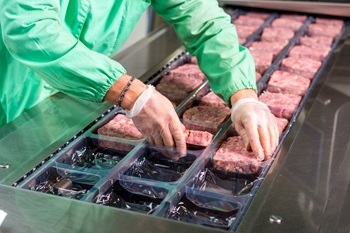By: Rick Stein, Vice President, Fresh Foods, FMI

If two letters sum up what most people are talking about in the food production and retailing business in 2024 it would be A.I. Indeed, the topic of artificial intelligence is on the minds and agendas of many throughout the farm-to-fork supply chain, from feed suppliers to farmers and ranchers to retail meat department managers and grocery executives.
According to FMI’s The Food Retailing Industry Speaks 2023, the food retail industry is finding more ways to use technology to meet its biggest needs in areas ranging from operations to customer experience. 85% of retailers were experimenting with new technologies to improve the customer experience in 2022, up from 73% in 2021. Furthermore, a groundbreaking shift is underway as one-quarter of retailers and over a third of suppliers harness artificial intelligence to revolutionize customer data, with an astonishing 60% of food suppliers and 23% of food retailers embracing this transformative technology.
While it’s a leading agenda item, what’s less clear is how, when, where and why to proceed with AI at respective points in meat production and retailing. This broad technology can be used to optimize cutting in meat processing facilities and to determine optimal flavor combinations in value-added products. At the store level, retailers can rely on AI to better predict demand for right-size assortments and pricing.
Those are just a few of myriad examples of potential AI applications. The simultaneous challenge and beauty of AI is the often-dizzying array of uses, not to mention the benefits and drawbacks of young, highly advanced technologies.
 The upcoming 2024 Annual Meat Conference, hosted by FMI and the Meat Institute, March 18-20, in Nashville, will provide clarity and focus on AI within the retail meat business. A general session on Tuesday, March 19, “The Use and Application of Artificial Intelligence - How to Make this Advanced Technology Work for Your Business”, will provide industry stakeholders with insights on how data application can deliver operational improvements, like enhanced efficiencies and a more reliable supply chain, while also better predicting shopper habits and needs. In today’s ever-competitive environment, the implications for cost reductions through AI will also be addressed. Among other suggestions, the experts leading this session will show that AI, while fueled by numbers, ultimately can be deployed to connect in a deeply personal way with the people who shop for meat and poultry products. AI tools can help consumers determine what products to buy and how to make them and determine barriers to purchases and consumption
The upcoming 2024 Annual Meat Conference, hosted by FMI and the Meat Institute, March 18-20, in Nashville, will provide clarity and focus on AI within the retail meat business. A general session on Tuesday, March 19, “The Use and Application of Artificial Intelligence - How to Make this Advanced Technology Work for Your Business”, will provide industry stakeholders with insights on how data application can deliver operational improvements, like enhanced efficiencies and a more reliable supply chain, while also better predicting shopper habits and needs. In today’s ever-competitive environment, the implications for cost reductions through AI will also be addressed. Among other suggestions, the experts leading this session will show that AI, while fueled by numbers, ultimately can be deployed to connect in a deeply personal way with the people who shop for meat and poultry products. AI tools can help consumers determine what products to buy and how to make them and determine barriers to purchases and consumption
The pace of change may be rapid and the implications broad, but AI is arriving and with it, the need for partners across the protein chain to understand how to best harness it now and in the coming years. To learn more about the general session on AI at AMC and other program highlights, visit https://meatconference.com/program. And don’t forget to register yourself along with your colleagues.


 Industry Topics address your specific area of expertise with resources, reports, events and more.
Industry Topics address your specific area of expertise with resources, reports, events and more.
 Our Research covers consumer behavior and retail operation benchmarks so you can make informed business decisions.
Our Research covers consumer behavior and retail operation benchmarks so you can make informed business decisions.
 Events and Education including online and in-person help you advance your food retail career.
Events and Education including online and in-person help you advance your food retail career.
 Food Safety training, resources and guidance that help you create a company food safety culture.
Food Safety training, resources and guidance that help you create a company food safety culture.
 Government Affairs work — federal and state — on the latest food industry policy, regulatory and legislative issues.
Government Affairs work — federal and state — on the latest food industry policy, regulatory and legislative issues.
 Get Involved. From industry awards to newsletters and committees, these resources help you take advantage of your membership.
Get Involved. From industry awards to newsletters and committees, these resources help you take advantage of your membership.
 Best practices, guidance documents, infographics, signage and more for the food industry on the COVID-19 pandemic.
Best practices, guidance documents, infographics, signage and more for the food industry on the COVID-19 pandemic.
